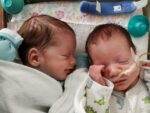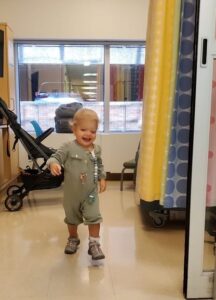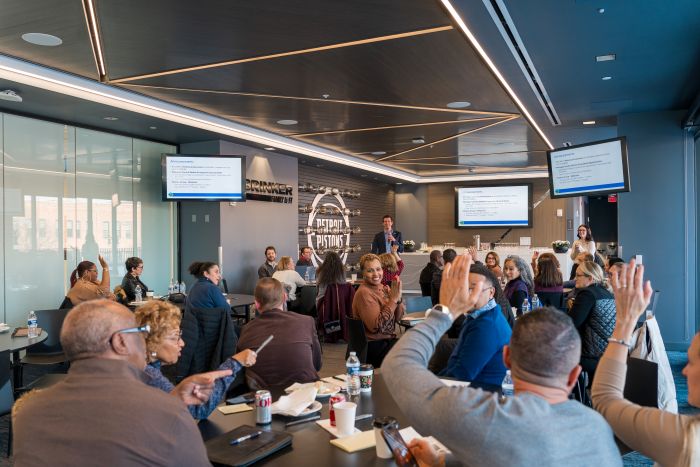“One day everything was fine and the next we had a child fighting cancer,” said Craig Salyers about his toddler Claire’s recent cancer diagnosis.
Like any new parents, when Salyers and wife Christina Cibrario found out they were pregnant with twins in December 2019, they anticipated the stress of sleepless nights and hungry babies. That was shadowed by raising infants during a pandemic, and then intensified when their daughter was diagnosed with a cancerous brain tumor at only five months old.
“We noticed something strange about Claire’s left eye since birth and it progressively got worse to the point it was kind of bulging out of her head,” said Cibrario.
It was a casual stay-at-home weekend in April 2020 when the couple texted a photo of Claire to their pediatrician who advised they immediately go to Emergency at Children’s Hospital of Michigan. With Salyers unable to accompany his wife, he waited by the phone for play-by-play updates, cuddling Claire’s twin brother, Graham.
It was a long day of worry with specialists testing and analyzing Claire, ultimately leading to news no parent ever wants to hear.





“She got an MRI that showed a brain tumor along her vision tract called an Optic Pathway Glioma or a tumor on her optic nerve,” said Claire’s oncologist, Dr. Stephanie Toll. “Because of her age, we performed a biopsy to confirm the tumor and gather genetic information on it.”
Genetic information helps doctors better understand the cancer so they can determine a personalized cancer therapy approach to target the tumor. By collecting this information, researchers hope to improve response rates to cancer treatment. Such research has helped guide Claire’s treatment which includes a regimen of chemotherapy for the duration of 18 months, which she has halfway completed.
This critical research is funded by The Children’s Foundation, which supports the collaborative work at Children’s Hospital of Michigan, C.S. Mott Children’s Hospital, Hurley Hospital of Flint, and Wayne State University. The Foundation’s support has been essential to making progress in this area, as there is an estimated gap of $30 million annually in childhood cancer funding in the United States.
“Pediatric brain tumors are the most common solid tumor in childhood,” Toll explained. “Children with cancer only get four percent of government funding and they’re worth so much more!”
For the past year, Claire has seen the walls of a hospital almost as much as those in her home. It has been a long journey of tests, tubes, and prayers, but Claire’s prognosis is optimistic.
“Claire is the toughest human I’ve ever met,” said Salyers. “She plays during chemo, doesn’t flinch when she’s poked and has handled everything super well. We were concerned she might have developmental delays due to the tumor, but she is right in line with her brother and even outpacing him in some instances.”
When finding out their child has a cancerous tumor, Salyers and Cibrario immediately went to a dark place of fear – the unknowns were insurmountable. But because of the research progress made with funding support from The Children’s Foundation, their outlook has changed significantly.
“Claire’s diagnosis has taught us to not take anything for granted,” said Cibrario. “We are very thankful for those who have donated to support this research.”
There is an estimated gap of $30 million annually in childhood cancer funding. The Foundation has committed to a three-year grant to support the collaborative work at Children’s Hospital of Michigan, C.S. Mott Children’s Hospital, Hurley Hospital of Flint, and Wayne State University.
UPDATE: 
As of September 2021, Claire finished her chemotherapy treatment. Doctors will now monitor her with an MRI every three months through 2023. The MRIs will continue on a less frequent basis through 2031.
“We are hopeful that the tumor never grows again and she never has to go back into treatment! Here is a photo of her waking out of the treatment room for the last time – like a boss!” said Salyers.



